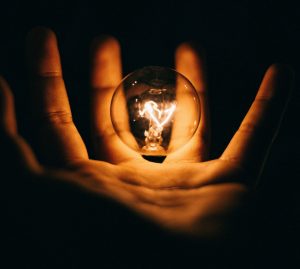I have a memory from my early twenties, standing at a table in the New York City restaurant I worked in with a dirty glass in my hand, chatting with a customer. I don’t remember how we got to talking or even what our conversation was about but I remember this one thing he said to me; “We have so few examples of power used well that many of us, women especially because they have even fewer examples, are afraid to step into their full power. Power itself has too many negative associations for us.” My reaction was to stand there staring at him. I had the feeling of something true washing over me but my brain needing more time to process it. Then he said to me, “Here’s my advice to you. Don’t be afraid of your own power. Power and abuse of power are not the same thing.” He left when I wasn’t looking and I never saw him again.
My success with this man’s advice over the 20 years or so since that encounter has varied. There have been times at which I have been able to fully own my power and times I have held myself back. There have also been times I’ve felt confident in my power and experienced the way our culture sometimes responds to a confident woman. This article is not specifically about women and power but it must be said; there are men who will give advice to an unknown woman in a restaurant about stepping into her power and there are men who will want to diminish her for trying.
I’ve had many clients of both genders wrestle with their comfort in fully embracing their power. It shows up in fears such as coming across as too aggressive, political, entitled, or cocky. Merriam-Webster’s definition of power is the “ability to act or produce an effect.” Oxford defines it as “the capacity or ability to direct or influence the behavior of others or the course of events.” It’s easy to read these definitions and hear the potential negative connotation. The twirling of the mustache while figuring out how to move people around like chess pieces. A lot of people need to work through that initial negative connotation when we talk about things like getting better at influencing others, advocating for self, and creating alliances.
As my mystery restaurant friend pointed out, it is not surprising that so many of us are uncertain about how to feel a positive concept of our power. Television and movies are filled with tyrants, politicians, greedy executives and bullies ready and willing to hurt others with their physical and social strength. In order to create the drama we want to watch, there has to be tension and that tension is usually created with situations where people are misusing and abusing power and privilege. Politics, the arena we most associate with power, is perpetually laden with scandal and corruption. And now we have the #Metoo movement which is a testament to decades of unspoken abuse by men in positions of power.
The way that this translates into the workplace is that it’s easier for us to identify “power“ when we see it asserted poorly. My clients usually have a ready list of the people around them who are annoyingly aggressive or political and reek of disingenuousness and self-interest. There are of course also examples of people around us using their power well, but we have come to the point where we almost don’t recognize power used well as power at all. Recently a client told me he had heard the phrase “power without aggression” and that he wanted to explore this because he felt this concept could help him feel more comfortable identifying and asserting his power. I too found myself drawn to the phrase because even though there is nothing about aggression in the definition of power, we have come to feel that they are inseparable. For those of us uncomfortable with that, we need a sort of reminder that using our power can look like something else.
So what else can it look like? To act, produce an effect, influence others or the course of events is something we all do every day. We do what we think needs to be done to move us towards our goals. We say things to people in the ways in which we hope will have the most impact. We choose our relationships and living environments based on what we wish our lives to look and feel like. We are influencing the course of events to try and live the lives we want to live. If we want to expand this influence, we need to get a little broader in our reach and a little more deliberate about what we’re doing. Inside an organization being more deliberate about who and what can help us accomplish the things we wish to accomplish can feel political in a way some people don’t like. And yet every good idea or right we have advanced in our society has come from this kind of deliberate action and alliance building. In order to generate momentum around anything, we have to figure out who else will benefit and how best to appeal to them for support. This is true whether we are trying to advance environmental awareness, get our idea for a new process approved by the CFO, or convince leadership we are ready for a promotion. The difference between these examples is their escalating self-interest. It’s often in the service of our own interest that so many begin to fear their own power.

This is where confidence comes into play. To lean into our power, we don’t need loud, boisterous confidence. We need quiet confidence in our intentions and our capabilities. In the same way we believe in a cause we’d fight for, we need to genuinely believe in the value of our contributions and what we have to bring to the table. What we have to offer might be similar or different than what others are offering. But it has to be ours. It could be intelligence, tenacity, energy, a learners mindset, or a unique perspective. Stepping into our power involves tuning into what we have to offer, connecting to why we want what we want and believing in the value of pursuing it. Power doesn’t have to be loud or aggressive. It does have to be rooted, sure and deliberate. When it’s rooted in self-doubt and anger, power gets ugly fast. But when it’s rooted in good intention and the belief we have something to bring to the table, power is just turning up the volume on who we are.
As I mentioned above, my comfort and success with owning my power has varied over the years. The times I’ve been the least successful have been the times I’ve been the least sure of myself. I lacked clarity on what I was pursuing and I wasn’t specific enough in defining to myself what I specifically had to offer. This impacted not only the way in which I was able to assert myself but my decisions about where to assert myself. We cultivate our confidence in our self-awareness which is on-going work. If we do the work of truly knowing who we are, we set ourselves up to know what it looks like to authentically step into our power. People who are authentic have a magnetism which is its own kind of power. We can’t achieve authenticity without clarity in who we are, what we believe in, and our right to go after what’s meaningful to us. People using power badly often don’t truly know any of this for themselves, but they are demonstrating all the outward manifestations of power anyway.
It’s important that we stay alert to the people around us who demonstrate a positive use of power. We need examples and reminders of the array of what this can look like. It can look like presence, confidence, curiosity, persistence, hope, belief, intelligence, conviction, clarity, rallying, or Oprah giving away free cars. Power shows up in all sorts of positive ways. Certainly we should take note of the powerful public figures we admire and how they maintain their integrity and make use of their broad influence. More importantly, when the people in our immediate lives and work places use power well, we need to label it as such. When someone has a strong presence that pulls you towards them, note it as powerful. When someone makes a point with admirable conviction or draws a disparate team together, identify it as a use of power. When a leader communicates effectively and earns respect by listening to their team, label this as an effective use of power. In this way we can start to have more positive associations with what being powerful looks like.
There are of course many who effectively use their power in positive ways and find it easy and natural to do so. But I know from experience how very many wrestle with this. They are smart, driven, well-intentioned, dynamic people. It seems to me that as those who are the most thoughtful and cautious find more ways to authentically step into their power, our workplaces and the world will become a better place.


Just like the word Absolutely: Power can be for Good or Evil. Great insight. Thanks.
Really insightful and well told. I love the end part around authenticity giving one both a freedom to be and the ability to influence and persuade in a genuine manner.